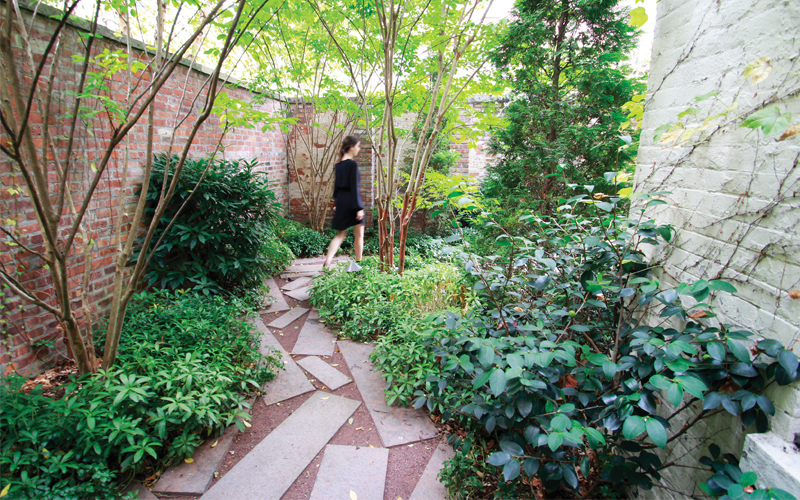Professional Practice
Improving Water Efficiency: Residential Rainwater Harvesting
 Stormwater runoff from the garden and roof is channeled into a cistern where the water is captured and gradually seeps into the water table. ASLA 2015 Professional Residential Design Honor Award. Brooklyn Oasis, Brooklyn, New York / Michael Van Valkenburgh Associates, Inc.
Stormwater runoff from the garden and roof is channeled into a cistern where the water is captured and gradually seeps into the water table. ASLA 2015 Professional Residential Design Honor Award. Brooklyn Oasis, Brooklyn, New York / Michael Van Valkenburgh Associates, Inc. Rainwater harvesting is a system that collects, diverts, and stores rain in a catchment tank -- often a barrel or buried cistern. Rainwater can be successfully used for landscape irrigation because rainwater is collected directly from the sky, where it is funneled off roofs. This harvested rainwater can also be used for car washing and toilet flushing. One inch of rainfall can generate 700 gallons of water runoff on a 1,200 square foot roof. A quarter inch of runoff can fill a rain barrel.
Rainwater harvesting is an efficient sustainable water management technique common before public utility departments centralized and then re-distributed water.
Rainwater harvesting benefits include:
- Reduced consumption of distributed potable water: Homeowners use up to half of a home’s total water consumption for landscape irrigation
- Reduced water bills and demand on existing water supply.
- More efficient use of rainwater resources.
Sources: Rainwater Harvesting, Texas A & M University; American Rivers; Energy Efficient Homes, University of Florida
Organizations
American Rainwater Catchment Systems Association
European Rainwater Catchment Systems Association
Harvest H2O
Rainwater Harvesting, Centre for Science and Environment
Research
"Design for Water: Rainwater Harvesting, Stormwater Catchment, and Alternate Water Reuse," Heather Kinkade-Levario, New Society Publishers, 2007
“Rainwater Harvesting for Drylands and Beyond, Vol. 1, Second Edition,” Brad Lancaster, Rainsource Press, 2013
“Harvesting Rainwater for Landscape Use,” Patricia H. Waterfall, Extension Agent, University of Arizona
“Gardening with Less Water: Low-Tech, Low-Cost Techniques; Use up to 90% Less Water in Your Garden,” David A. Bainbridge, Storey Publishing, 2015
“Creating Rain Gardens: Capturing the Rain for Your Own Water-Efficient Garden,” Apryl Uncapher & Cleo Woelfle-Erskine, Timber Press, 2012
Resources
Rain Barrels and Cisterns, Urban Design Tools, Low Impact Development
Toronto Homeowner’s Guide to Rainfall, RiverSides
Using Rainwater to Grow Livable Communities, Water Environmental Research Foundation
Using Rainwater in Urban Landscapes: Quick Guide for Maricopa County, University of Arizona
Use of Graywater in Urban Landscapes in California, University of California Agriculture and Natural Resources
Rainwater Harvesting – Sourcing the Rain, Greywater Action
Government Resources
How to Manage Stormwater – Rain Barrels, Environmental Services, City of Portland
Oregon Smart Guide – Rainwater Harvesting, Department of Consumer & Building Services, State of Oregon
Rainwater Harvesting, Seattle Public Utilities
Residential Greywater Rebate, City of Tempe, Arizona
Rainwater Catchment Incentive Program, Marina Coast Water District
Graywater Guidelines, Water Conservation Alliance of Southern Arizona
Texas Manual on Rainwater Harvesting, Texas Water Development Board
Rainwater Collection in Washington State, Department of Ecology, State of Washington
Rain Barrels, Milwaukee Metropolitan Sewerage District
Residential Stormwater Credits, City of Ann Arbor Michigan
Slow it. Spread it. Sink it! A Homeowner’s Guide to Greening Stormwater Runoff, Conservation District of Santa Cruz County
Rainwater Harvesting Pilot Project, City of Albuquerque
Rain Barrel & Cistern Rebate, Metropolitan Water District of Southern California
Projects
Water Calculation and Poetic Interpretation, Monterey Cypress, California
Arterra Landscape Architects
Brooklyn Oasis, Brooklyn, New York
Michael Van Valkenburgh Associates, Inc.
Quaker Smith Point Residence, Burlington, Vermont
H. Keith Wagner Partnership
Mill Creek Ranch, Vanderpool, Texas
Ten Eyck Landscape Architects Inc.